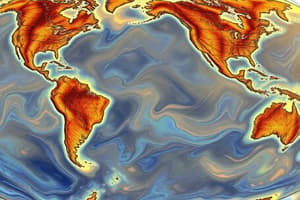Podcast
Questions and Answers
What was a significant characteristic of the Gulf Stream during the last ice age?
What was a significant characteristic of the Gulf Stream during the last ice age?
- It had no impact on global climate.
- It was directed towards the Indian Ocean.
- It was significantly weaker than today.
- It was significantly stronger than today. (correct)
What research methodology was used to assess the prehistoric strength of the Gulf Stream?
What research methodology was used to assess the prehistoric strength of the Gulf Stream?
- Model simulations of climate patterns.
- Analysis of fossil foraminifera from sediment cores. (correct)
- Analysis of satellite data from the North Atlantic.
- Study of modern ocean current patterns.
What potential effect could a future weakened Gulf Stream have on Europe?
What potential effect could a future weakened Gulf Stream have on Europe?
- Increased tropical heat reaching Europe.
- Significant cooling of the continent. (correct)
- Severe reduction in cold weather events.
- Higher sea levels in the Mediterranean Sea.
How does the Gulf Stream relate to the Atlantic Meridional Overturning Circulation (AMOC)?
How does the Gulf Stream relate to the Atlantic Meridional Overturning Circulation (AMOC)?
What does the study suggest about the effects of climate change on the AMOC?
What does the study suggest about the effects of climate change on the AMOC?
What is the primary function of the Atlantic Meridional Overturning Circulation (AMOC)?
What is the primary function of the Atlantic Meridional Overturning Circulation (AMOC)?
How does AMOC affect global weather patterns?
How does AMOC affect global weather patterns?
What could be a potential consequence of a weakened AMOC?
What could be a potential consequence of a weakened AMOC?
Which of the following factors could contribute to the decline of AMOC?
Which of the following factors could contribute to the decline of AMOC?
What role does the Antarctic Circumpolar Current (ACC) play in relation to AMOC?
What role does the Antarctic Circumpolar Current (ACC) play in relation to AMOC?
Flashcards are hidden until you start studying
Study Notes
Gulf Stream Study Highlights
- Recent research published in Nature indicates the Gulf Stream was significantly stronger during the last ice age, approximately 20,000 years ago.
- Increased wind strength across the subtropical North Atlantic contributed to this enhanced strength of the Gulf Stream.
- The Gulf Stream influences climate in Western Europe, keeping it warmer than it would naturally be.
Research Methodology
- Analysis of fossil foraminifera from sediment cores off North Carolina and Florida was utilized to assess the Gulf Stream’s prehistoric strength.
- Findings reveal that during the last ice age, the Gulf Stream was twice as deep and fast compared to current conditions.
Climate Impact
- Despite the heightened strength of the Gulf Stream, the overall global climate during the last ice age was considerably colder than today.
- A potential future weakening of the Gulf Stream could restrict tropical heat from reaching Europe, leading to cooler temperatures and increased sea levels along North America.
Atlantic Meridional Overturning Circulation (AMOC)
- The Gulf Stream is part of the AMOC, which plays a crucial role in deep water formation and wind pattern interactions.
- Climate change-related disruptions, including the influx of melting Greenland glacial water, may weaken the AMOC.
- A weakened AMOC could lead to temperature drops in Europe of 10 to 15 degrees Celsius, disrupt agricultural practices, and alter weather conditions.
AMOC Structure and Function
- AMOC is a complex system of ocean currents that functions as part of the global ThermoHaline Circulation (THC), essential for distributing heat and nutrients across oceans.
- It moves warm tropical surface waters to the Northern Hemisphere, where they cool, sink, and flow back as a bottom current through the South Atlantic.
Implications of AMOC Decline
- A diminished AMOC can cause colder climates in Europe, decreased rainfall, and alter significant weather patterns, such as influencing El Niño and monsoon shifts in South America and Africa.
- Predictions indicate that global warming could weaken major ocean currents, affecting overall climate stability.
- Melting ice from Greenland, particularly from the "Last Ice Area," introduces freshwater that reduces salinity and density, further inhibiting AMOC flow.
Importance of AMOC
- The AMOC plays a vital role in redistributing heat and regulating global weather patterns, underscoring its significance in climate research and climate change discussions.
Studying That Suits You
Use AI to generate personalized quizzes and flashcards to suit your learning preferences.




